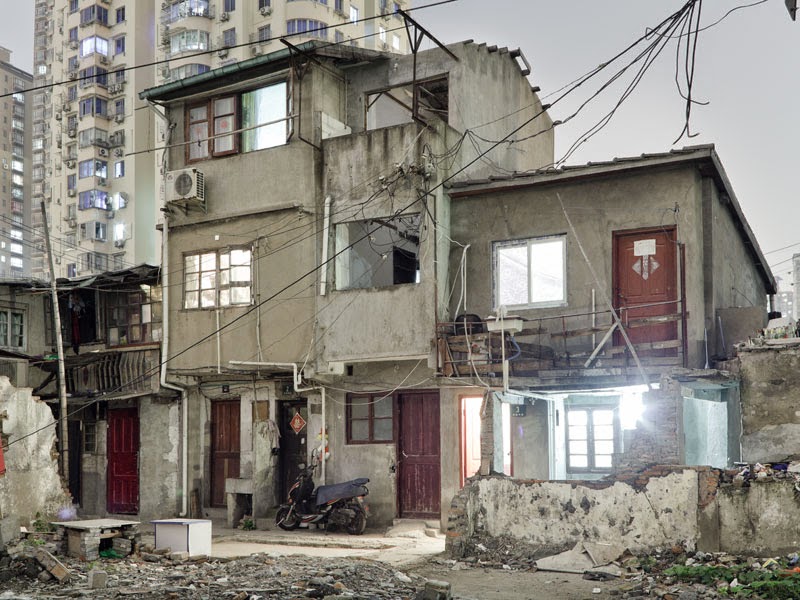viernes, 27 de junio de 2014
sábado, 31 de mayo de 2014
Abandoned Shopping Centers
Equipado solo con un coche híbrido y una cámara, el
fotógrafo Seph Lawless ha
viajado por Estados Unidos haciendo fotos de centros comerciales abandonados.
Sus estructuras vacías no son quizás lo primero que a uno le vendría a la mente
si buscase algo que fotografiar, pero el objetivo de Lawless hace que estos
espacios se conviertan en inquietantes retratos de una época pasada.
De escaleras mecánicas en desuso rodeadas de azulejos caídos
del techo a descoloridos centros de atención al cliente flanqueados por
plantas, las fotografías ofrecen una visión de aspectos a menudo ignorados de
la expansión suburbana contemporánea. Localizadas en Indiana, Ohio, Michigan y
Pensilvania, las
ruinas de Rust Belt son las consecuencias de la pérdida de empleo,
explicó Lawless al HuffPost. Como las oportunidades de producción siguen cayendo
y la población de las ciudades fluctúa como consecuencia de la recesión
económica, los centros comerciales gigantes son insostenibles. Cuando no son
demolidos, se convierten en fantasmas de tiempos mejores.
https://www.facebook.com/pages/Arquitectura/157540721112454
jueves, 15 de mayo de 2014
The Thames Barrier |
The Thames Barrier is located downstream of central London, on the river Thames on the eastern side of the capital at Woolwich. It is the world’s second largest after the Oosterscheldekering barrier in the Netherlands. The barrier was built in 1982 to prevent folding of all but the easternmost boroughs of Greater London by exceptionally high tides and storm surges moving up from the North Sea. The barrier is made up of 9 steel gates reaching 520m across the river. When open, the gates lie flat on the river floor allowing the Thames to flow freely and ships to pass through the gates. When closed, the gates are rotated upwards until they block the river. The gates, which are hollow and made of 1.6 inch-thick steel, span 61 meters and each weigh 3,200 tonnes. The gates are filled with water when submerged and empty as they emerge from the river.
viernes, 18 de abril de 2014
domingo, 13 de abril de 2014
martes, 25 de febrero de 2014
A Retrospective Exploration of Sanzhi Pod City | Via | Hey-Gem
Some called them the ‘UFO houses’ or ‘ruins of the future’
on account of their bizarre appearance. And there’s little doubt that the
abandoned buildings making up Sanzhi Pod City constituted one of the world’s
strangest modern ghost towns before they were torn down in late 2008. This
series of images takes us on a retrospective wander through the ruins, which
became an offbeat tourist attraction and remain the subject of online
discussions and articles.
Resembling Futuro houses, the unique structures in New
Taipei City were built in 1978 as a holiday resort aimed at US military
personnel serving in East Asia. But the project failed to take off and was
abandoned two years later amid rumours of unfortunate accidents that cast a
bleak shadow over the development.
Local folklore holds that the site had been a burial ground
for Dutch soldiers, who had somehow been disturbed by the construction work.
Others suggest that the widening of a nearby road had interfered with the
sculpture of a Chinese dragon, bringing ill-fortune to the so-called UFO
houses. Whatever the truth behind the myth, a series of financial failings
appear to be real reason for Sanzhi’s demise.
sábado, 22 de febrero de 2014
25 ABANDONED SOVIET MONUMENTS THAT LOOK THE FUTURE
These structures were sent to build by former Yugoslavian president Josip Broz Tito in the 1960s and 70s to commemorate sites where battles took place in World War II. In the 80s, these monuments attracted millions of visitors each year. After the Republic dissolved in 1990, were abandoned completely and their symbolic meanings were forever lost.
Suscribirse a:
Comentarios (Atom)






























































